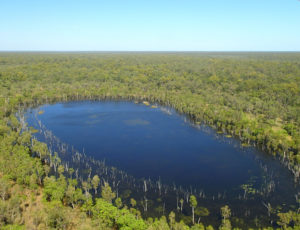31 May 2018
Large feral animals such as pigs and buffalo cause significant damage to aquatic ecosystems across northern Australia, affecting biodiversity, ecosystem function and Indigenous cultural values. Hub research led by Dr Justin Perry of CSIRO is informing land and water management decisions by Indigenous communities on Cape York Peninsula through developing robust and locally relevant metrics for measuring the impact of feral animals on environmental and cultural assets, and by improving ongoing monitoring and communication of results. This is allowing Traditional Owners to weigh up their desire for retaining feral animals as a resource against their impact on other values identified as important by the community, and target management of selected assets.
The project has contributed to fundamental changes in how Aak Puul Ngangtam (APN; a registered charity entirely owned by Traditional Owners of the Southern Wik Homelands) conducts feral animal management which has led to quantifiable changes in nationally and internationally important threatened species conservation. The research informs a collaborative turtle monitoring and predator management program that over the past six years has led to a massive 90% reduction in predation of three threatened marine turtles (Olive Ridley, Flatback and Hawksbill) on 48km of beach in the APN management area. This success has been maintained for two years and the comprehensive feral pig management and monitoring program that informs it has grown in scale and detail over time. The research team is now developing a framework to transfer this approach to other areas in northern Australia through robust environmental metrics.
The cultural values work undertaken by the project team and facilitated by APN has supported a senior Traditional Owner and her family to visit homelands along the Archer River. This provided a unique opportunity to record information on contemporary and historic environmental and cultural values and how feral animals have impacted these. Discussions generated important information and insights about how different values could be protected, as well as identified trade-offs between competing values.

Wetlands such as this one on Cape York Peninsula can be damaged by large feral animals like pigs, photo Peter Negus.
Want to know more about the Resilient Landscapes Hub's activities and our research into practical solutions to environmental problems? Stay informed about activities, research, publications, events and more through the Hub newsletter.
"*" indicates required fields